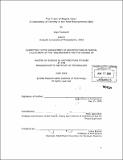The prison of Regina Coeli : a laboratory of identity in the Post-Risorgimento Italy
Author(s)
Touloumi, Olga
DownloadFull printable version (11.98Mb)
Other Contributors
Massachusetts Institute of Technology. Dept. of Architecture.
Advisor
Mark Jarzombek.
Terms of use
Metadata
Show full item recordAbstract
In my thesis I am studying the prison of Regina Coeli in Rome. Completed in 1892, it occupies the space of the convent after which it was named: the convent of Santa Maria Regina Coeli. The particular prison was built in the aftermath of the Italian unification when national identity was still formulated and the economy industrialized. At the same period, the discussion on prison architecture was shifting from an interest in the panopticon-centered structures to the architecture of the cell. Penitentiaries were transformed from sites of mere constrain, to sites of correction, to later develop into laboratories of identity. Along with the research on the typical cell, the field of criminology was objectifying the criminal body, in pursuit of the delinquent type. Although rarely documented, Regina Coeli was built in this transition before modernity appeared in the structure of the penitentiary institutions. (cont.) I explore the particular prison not only as the product of this multiple transition, but also as the vehicle to forge it. Being the main custodial prison of the Kingdom of Italy, Regina Coeli constituted the portal to the Italian penitentiary network. The convicts awaiting trial, executing the last part of their sentence or pending transfer to other prisons or penal colonies were situated in the prison. In my thesis the issues of national identity, architectural historiography and identity politics are addressed through the study of the prison of Regina Coeli.
Description
Thesis (S.M.)--Massachusetts Institute of Technology, Dept. of Architecture, 2006. Includes bibliographical references (leaves 97-104).
Date issued
2006Department
Massachusetts Institute of Technology. Department of ArchitecturePublisher
Massachusetts Institute of Technology
Keywords
Architecture.